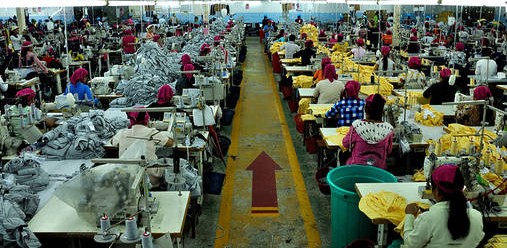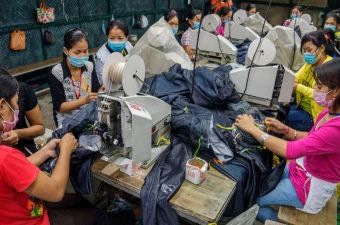A new report has alleged labour rights abuses at Cambodian supplier factories for apparel giant H&M. CLC Trade union leader Ath Thorn confirms the conclusions. The main concern of workers is that their work is not stable. They are afraid that they will lose their job any day. And it’s still common for companies to terminate a worker’s contract if the worker becomes pregnant.
Many workers are forced to work overtime in order to survive. Otherwise their income won’t be sufficient. If workers say no to overtime once or twice, they are blacklisted.
Garment worker Chan Tona says she has only been offered three-month contracts, “but if I join any union’s activities, I will face firing”
Short term contracts have skyrocketed
“Short-term contracts make it easier for employers to terminate workers with no severance package, and limit workers’ ability to participate in unions “, continues Ath Thorn, president of the Cambodian Labour Confederation CLC (partner organisation of CNV Internationaal in Cambodia). “Until some years ago short-term contracts represented only 10 per cent of contracts in the industry," Thorn ads,” but have since skyrocketed.
More than 500 garment workers gathered 22 May in Phnom Penh to air some of the same concerns over working conditions during a workers’ forum.
The independent investigation was realised by Asia Floor Wage Alliance, which interviewed 201 workers at 12 H&M supplier companies in Phnom Penh and the surrounding areas. The investigators found that a large number of workers at nine of the factories were improperly employed on fixed-duration contracts.
Out of 42 workers employed on fixed duration contracts, 28 did not receive social security, maternity or seniority benefits.

Women fired when pregnant
Many were forced to work long overtime hours. Others were threatened with termination if they became pregnant.
Thorn said the government should take action against employers and threaten to shut down their business if no improvements are seen, but was doubtful the government would step in to address the issues. “Now, the government is a little bit slow, especially when it comes to punishing the employers,” he adds.
H&M didn’t respond to a request for comment yet, but a company representative told Reuters that it was collaborating with trade unions, governments and the ILO to improve working conditions.
According to Phnom Penh Post, government spokesman Phay Siphan said the government just acts as a mediator between the employers and the employees, and added that improvements have been seen in the garment industry “Employees understand their rights”
Nevertheless workers, except from the health insurance scheme, don’t see progress from the government. To the contrary, recent changes of labour legislation are a serious threat to trade union freedom.
Publication date 01 06 2016


